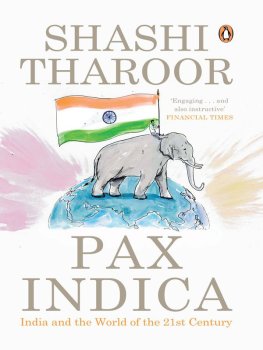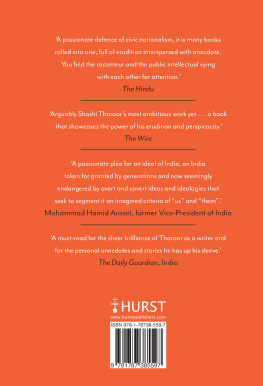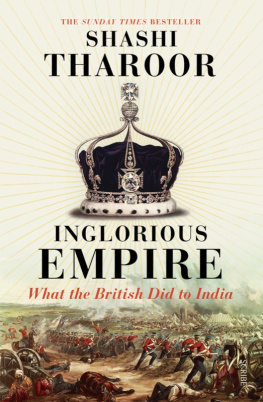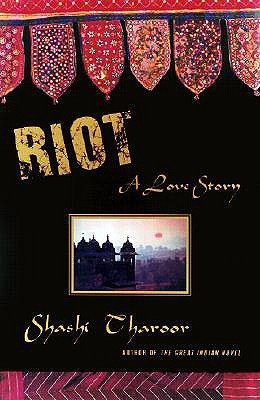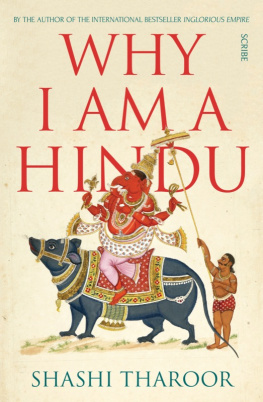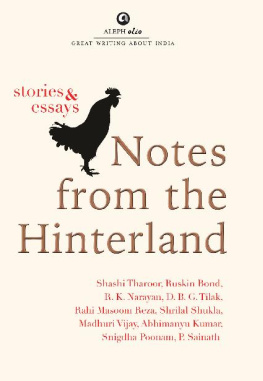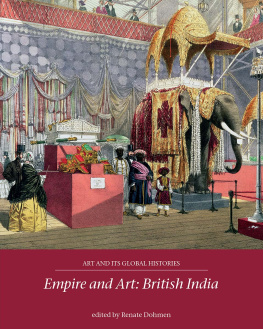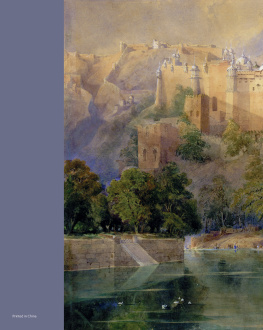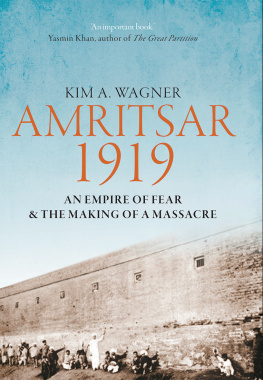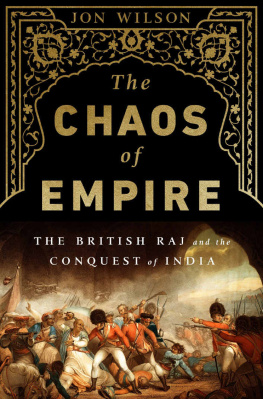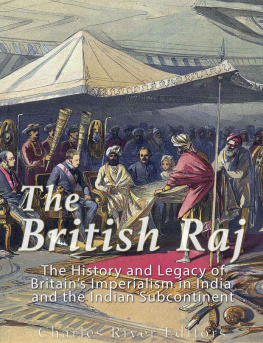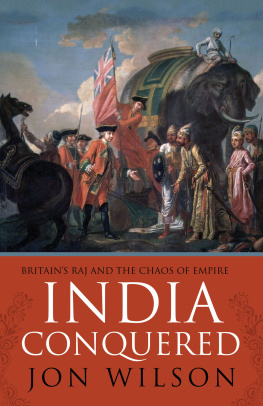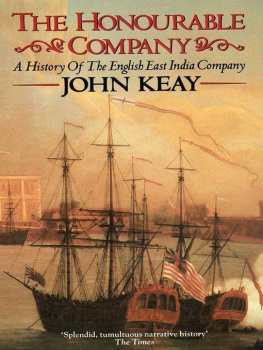ALSO BY SHASHI THAROOR
NON-FICTION
India Shastra: Reflections on the Nation in Our Time
India: the Future is Now (ed.)
Pax Indica: India and the World of the 21st Century
Shadows Across the Playing Field: 60 Years of India-Pakistan
Cricket (with Shahryar Khan)
India (with Ferrante Ferranti)
The Elephant, the Tiger, and the Cell Phone: Reflections on India in the 21st Century
Bookless in Baghdad
Nehru: The Invention of India
Kerala: Gods Own Country (with M. F. Husain)
India: From Midnight to the Millennium and Beyond Reasons of State
FICTION
Riot
The Five Dollar Smile and Other Stories
Show Business
The Great Indian Novel
ALEPH BOOK COMPANY
An independent publishing firm
promoted by Rupa Publications India
First published in India in 2016
by Aleph Book Company
7/16 Ansari Road, Daryaganj
New Delhi 110 002
Copyright Shashi Tharoor 2016
All rights reserved.
The views and opinions expressed in this book are the authors own and the facts are as reported by him/her which have been verified to the extent possible, and the publishers are not in any way liable for the same.
While every effort has been made to trace copyright holders and obtain permission, this has not been possible in all cases; any omissions brought to our attention will be remedied in future editions.
No part of this publication may be reproduced, transmitted, or stored in a retrieval system, in any form or by any means, without permission in writing from Aleph Book Company.
ISBN: 978-93-84067-88-5
This book is sold subject to the condition that it shall not, by way of trade or otherwise, be lent, resold, hired out, or otherwise circulated without the publishers prior consent in any form of binding or cover other than that in which it is published.
For
my sons, Ishaan and Kanishk,
whose love of history equals,
and knowledge of it exceeds,
my own
But tis strange.
And oftentimes, to win us to our harm,
The instruments of darkness tell us truths
William Shakespeare, Macbeth, Act I, scene iii
Thy hand, great Anarch! lets the curtain fall;
And universal darkness buries all.
Alexander Pope, The Dunciad
We live in the flickermay it last as long as the old earth
keeps rolling! But darkness was here yesterday.
Joseph Conrad, Heart of Darkness
Indiaa hundred Indiaswhispered outside beneath the
indifferent moon, but for the time India seemed one and their own, and they regained their departed greatness by hearing its departure lamented
E. M. Forster, A Passage to India
CONTENTS
The Oxford speech Indian reactions criticisms taken into account history is neither for excuses nor for revenge
Durants outrage the conquest of India by a corporation the East India Company the deindustrialization of India destruction of Indian textiles extraction, taxes and diamonds Clive and Plassey the nabobs corruption revenue collection and the drain of resources the Permanent Settlement Indian military contributions to Empire Naorojis indictment the destruction of shipping and shipbuilding stealing from Indian steel how India missed the Industrial Revolution the Scots benefit
British claim to creating Indian unity the ancient idea of India and the centralizing impulse counterfactuals of history the destruction of political institutions overthrow of native princes weakening of village self-governance Indian social structures unfamiliar to the British increasing British control deinstitutionalization of governance native rulers not worse than Company the Crown takes over its jewel imperial ostentation and ornamentalism Curzon and British self-regard the un-Indian Civil Service lifestyles of the rich and infamous Indians in imperial service exclusion and suppression of Indian talent Chetty, Tagore, Banerjea, Ghosh imperial racism: only disconnect British governance, the swadeshi movement and the advent of Mahatma Gandhi the MontaguChelmsford reforms the Great War and the great betrayal
The British case for liberal democracy the (partly) free press freedom and constraints the rise of Indian newspapers the Vernacular Press Act The Hindu the Amrita Bazar Patrika & its Kashmir expos the Press Act of 1910 the Parliamentary system in India rule of law: the boot and the spleen Can Englishmen murder Indians? misogynous laws racism criminal tribes colonial-era prejudices entrenched in Indian Penal Code Section 377, sedition & adultery British laws outlived colonialism
Divide and rule as a colonial project caste, race and classification the creation of community feeling the British punditocracy how the census undermined consensus British colonialism self-justified caste reified by colonialism the HinduMuslim divide communalism as a colonial construction the Indian National Congress and the Muslim League the British and the ShiaSunni divide British communal bias a saint among sinners separate electorates stumbling towards Armageddon Congress resignations Quit India the revival of the Muslim League the Cripps Mission endgame: election, revolt, division negotiations over withdrawal two surrenders: the British give up and the Congress gives in quitting India, creating Pakistan a tryst with destiny
The case for enlightened despotism feast and famine: the British and starving India the British colonial holocaust famines and British policy Adam Smith & Malthus troubled consciences, untroubled indifference Lord Lyttons benign neglect Indians active in relief numerical rhetoric the Bengal Famine and Churchills attitude forced migration: transportation and indentured labour the Straits Settlements, Mauritius and elsewhere indentured labour the Brutish Raj colonial massacres the story of Jallianwala Bagh reign of terror by General Dyer the British reward a killer
British profits, Indian taxes private enterprise and public risk benefits to Britain exploitation of Indian passengers discrimination in employment the Great Indian Railway Bizarre economic distortions caused by railways British education policy destruction of Indian education pathshalas, madrasas, maktabs education and the English language Macaulays Minute on Education Mills Utilitarianism Orientalists versus Anglicists limitations of Indian universities denationalizing Indians textual harassment British history English literature influence of Western ideas caste and education colonization of the Indian mind Wodehouse, colonialism and the English language tea without sympathy exploitation of plantation workers tea spreads to Indians the Indian game of cricket cricket and social status Ranji cricket and nationalism
The (Im)balance sheet: a coda positives and negatives imperial pretensions, colonial consequences efficiency and indifference versus exploitation comparative performance of India during and after Empire Indian rejection of British capitalism positive by-products of British policies the moral barrier British policy on opium contemporary condemnation social reform mainly by Indians the British remained foreigners, unlike Muslim rulers The Brown Mans Burden
Consequences of Empire imperial amnesia echoes in todays world Fergusons case for Empire atonement returning the jewel in the crown resisting colonialism; the appeal of Gandhism Gandhism unrealistic against modern violence cast a long shadow: residual problems of colonialism
Next page

